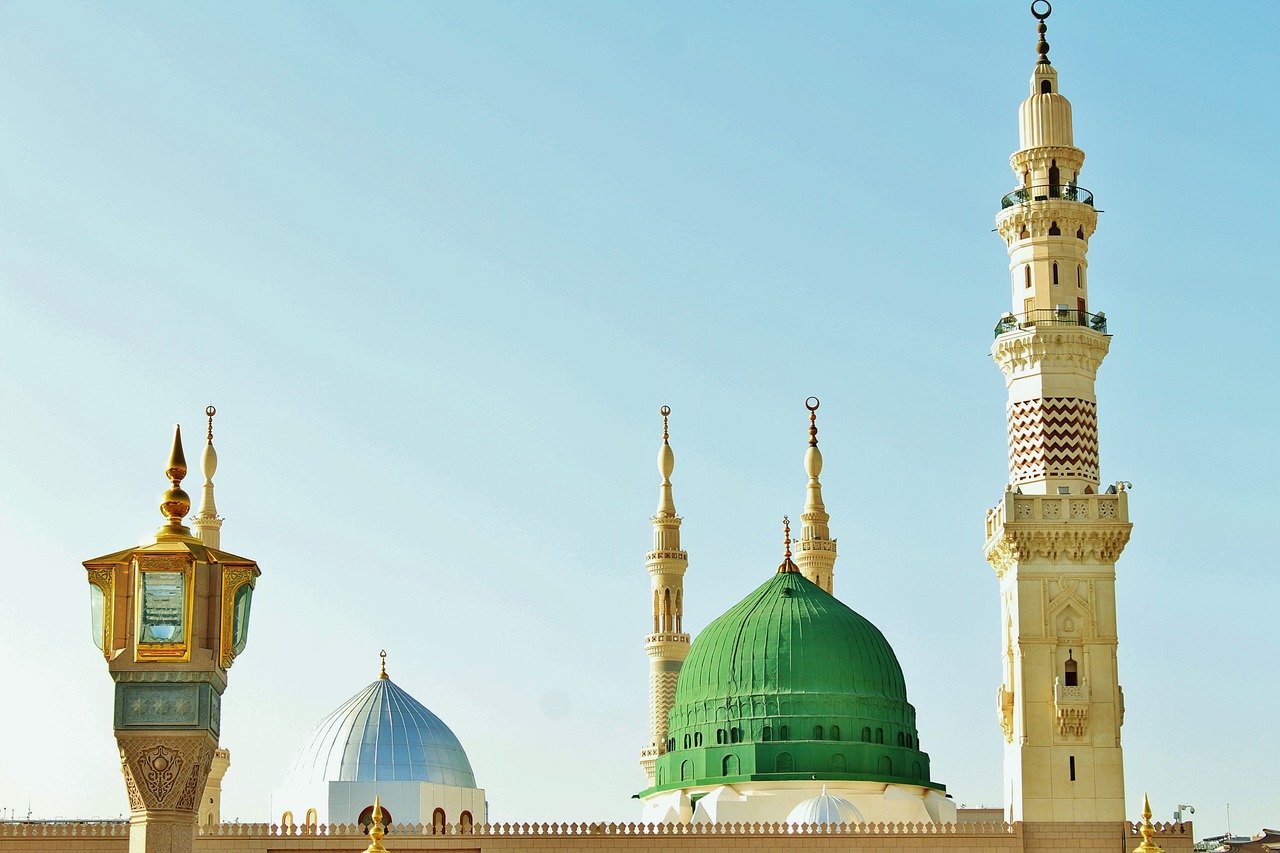Introduction
Prophet Muhammad ﷺ is revered as the final messenger of Islam, whose teachings have influenced billions worldwide. Known for his exemplary character, spiritual insights, and unwavering dedication to truth, his life offers profound lessons for humanity. From his humble beginnings to his momentous prophethood, his story is one of compassion, resilience, and divine purpose.
This article explores the life history of Prophet Muhammad ﷺ, including his full name, birth and death dates according to the Islamic calendar, his story, and more.
What Is Muhammad ﷺ Best Known For?

Prophet Muhammad ﷺ is best known for being the final prophet of Islam, tasked with conveying Allah’s message to humanity through the Quran. His mission transformed a divided, polytheistic Arabian Peninsula into a monotheistic society based on justice, equality, and compassion.
In addition to his spiritual role, he is recognized as a leader who established Medina as the first Islamic state. His leadership, grounded in integrity and wisdom, continues to serve as a model for governance, diplomacy, and social reform.
Muhammad’s Full Name and Title
The full name of Prophet Muhammad ﷺ is Muhammad ibn Abdullah ibn Abdul-Muttalib ibn Hashim. He belonged to the prestigious Quraysh tribe, specifically the Banu Hashim clan, which held significant status in pre-Islamic Arabia.
The honorific “ﷺ” (Peace and blessings be upon him) is a mark of respect for the Prophet, commonly used by Muslims when mentioning his name.
When Was Prophet Muhammad ﷺ Born (Islamic Date)?
Prophet Muhammad ﷺ was born on 12th Rabi’ al-Awwal, 570 CE, according to the Islamic calendar. This day is widely celebrated as Mawlid al-Nabi, commemorating his birth and the blessings he brought to the world.
His birth in the “Year of the Elephant” coincided with a miraculous event involving the Kaaba’s protection from an invading army led by Abraha, as described in the Quran (Surah Al-Fil).
Prophet Muhammad ﷺ’s Childhood and Early Life
Born in Mecca, Muhammad ﷺ experienced the loss of his father, Abdullah, before his birth and later his mother, Amina, at a tender age. Raised initially by his grandfather, Abdul-Muttalib, and later by his uncle, Abu Talib, he grew up in a nurturing yet modest environment.
Even in his youth, he earned the titles “Al-Amin” (The Trustworthy) and “As-Sadiq” (The Truthful), reflecting his impeccable character.
Prophet Muhammad ﷺ’s Mission and Revelation

At the age of 40, while meditating in the Cave of Hira, Muhammad ﷺ received his first revelation from Allah through Angel Jibreel (Gabriel). The first verses of the Quran, Surah Al-Alaq, were revealed, marking the beginning of his prophethood.
His mission called people to worship one God (Allah) and abandon idolatry. Despite fierce opposition, he remained steadfast, gaining followers and spreading Islam’s universal message.
The Migration to Medina (Hijrah)
Facing increasing persecution in Mecca, Muhammad ﷺ and his followers migrated to Medina in 622 CE. This migration, known as the Hijrah, marked the beginning of the Islamic calendar.
In Medina, he established the Constitution of Medina, fostering a pluralistic society where Muslims, Jews, and Christians coexisted peacefully.
What Was Muhammad ﷺ’s Last Word Before He Died?
The final moments of Prophet Muhammad ﷺ’s life were spent in the company of his family. His last words, as recorded in Islamic tradition, reflect his concern for the well-being of his followers:
“The prayer, the prayer! And fear Allah regarding those under your care.”
These words emphasize the importance of maintaining connection with Allah through prayer and fulfilling responsibilities toward others.
When Did Prophet Muhammad ﷺ Die (Islamic Date)?

Prophet Muhammad ﷺ passed away on 12th Rabi’ al-Awwal, 632 CE, exactly 63 years after his birth. His death occurred in Medina, in the room of his beloved wife, Aisha (RA).
His passing marked the end of revelation, but his teachings continue to illuminate the path of countless believers.
Is Muhammad ﷺ Mentioned in the Bible?
Muslim scholars and theologians often point to certain biblical verses they believe foretell the coming of Prophet Muhammad ﷺ. For instance, the “Paraclete” mentioned in the Gospel of John is interpreted by some as a reference to the Prophet.
While interpretations vary, the Quran asserts in Surah Al-A’raf (7:157) that Muhammad ﷺ is mentioned in earlier scriptures.
Prophet Muhammad ﷺ’s Legacy
Muhammad ﷺ’s impact transcends religion. His teachings on social justice, economic fairness, and human rights resonate across cultures. He emphasized kindness to orphans, fair treatment of women, and respect for all creation.
Key principles of his legacy include:
- Advocating for peace and reconciliation.
- Promoting knowledge and education.
- Emphasizing charity and community support.
Prophet Muhammad ﷺ’s Story in Arabic
The Arabic rendition of Muhammad ﷺ’s name is: محمد بن عبد الله بن عبد المطلب بن هاشم. His story, as told in the Quran and Hadith, is an inspiring narrative of perseverance, humility, and devotion to Allah.
Life History of Prophet Muhammad ﷺ from Birth to Death (PDF)
For those seeking a detailed study, numerous PDFs and resources are available online, chronicling the Prophet’s life from birth to death. These accounts delve into his personal experiences, leadership style, and the socio-political context of his era.
Key Events in Prophet Muhammad ﷺ’s Life
- Birth: 12th Rabi’ al-Awwal, 570 CE.
- Marriage to Khadijah (RA): A union that supported his mission.
- First Revelation: In the Cave of Hira, at age 40.
- Hijrah: Migration to Medina in 622 CE.
- Farewell Pilgrimage: His last public address to the Muslim community.
- Death: 12th Rabi’ al-Awwal, 632 CE.
FAQs
What is Muhammad ﷺ best known for?
He is best known as the final prophet of Islam and for conveying the Quran, establishing a just society, and exemplifying compassion and leadership.
What was Muhammad ﷺ’s last word before he died?
His last words emphasized prayer and care for others: “The prayer, the prayer! And fear Allah regarding those under your care.”
What is Muhammad ﷺ’s full name?
His full name is Muhammad ibn Abdullah ibn Abdul-Muttalib ibn Hashim.
Is Muhammad ﷺ mentioned in the Bible?
Some scholars interpret biblical references, such as the “Paraclete” in the Gospel of John, as allusions to Muhammad ﷺ.
When was Prophet Muhammad ﷺ born (Islamic date)?
He was born on 12th Rabi’ al-Awwal, 570 CE, in Mecca.
When did Prophet Muhammad ﷺ die (Islamic date)?
He passed away on 12th Rabi’ al-Awwal, 632 CE, in Medina.
Conclusion
The life of Prophet Muhammad ﷺ is a beacon of guidance, inspiring individuals and communities across time. His unwavering commitment to spreading Allah’s message, coupled with his humility and compassion, cements his place as one of the most influential figures in history.
His legacy, preserved in the Quran and Sunnah, continues to guide Muslims and non-Muslims alike toward a path of righteousness, justice, and unity.










